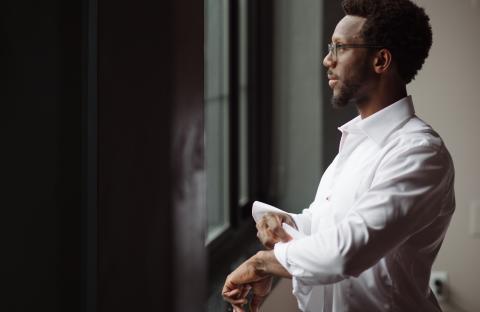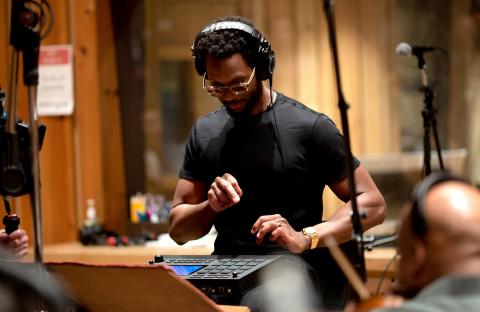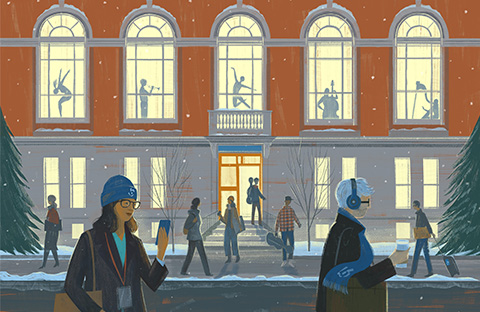Bridging Genres

Photo by Brian Hatton
Rare is the musical artist whose credentials include a platinum hip-hop record and a commission from the New York Philharmonic. Boston Conservatory at Berklee Associate Professor Anthony Barfield has managed to achieve both, with one foot firmly planted in classical composition and the other in pop music production. He draws from these two very different worlds, as well as his experience as a digital media producer, to teach a foundational course required of every Boston Conservatory undergraduate, Introduction to iPad Media Technology. At the heart of Barfield’s many accomplishments—and the Conservatory course he teaches—is a creative adaptability that is rooted in cultural fluency and hands-on experimentation.
The word “multifaceted” is used a lot in the music world, but seldom are an artist’s facets as disparate as Barfield’s. Over the last decade, he has moved from classical composer to hip-hop producer and back again. His most recent project, Symphony 808, is a mashup of the two genres, combining a fully composed work for orchestra with the kind of programmed drum beats that can pack a dance floor. Uniquely qualified to write the piece, Barfield aims to show what hip-hop has to offer classical music and vice versa. In the process, he hopes to cultivate a broad-minded audience—one that engages with Western classical and Black popular music traditions on equal terms.
Barfield’s first love, musically speaking, was the trombone, which he took up in middle school, but he always had a composer’s ear. As a band student, he would pick out the other instrument parts and occasionally play along with the trumpets, flutes, or saxophones. In high school, he fell hard for beat making after a cousin who was working as a pop producer sent him some production equipment to experiment with. At home on his family’s farm in Collinsville, Mississippi, he worked on beats obsessively and spent hours a day teaching himself how to use the gear.
“I would stay up late every night and go to school tired the next morning,” Barfield says. “I didn’t know anything about producing. I just thought of making beats.”
As an undergraduate at the Juilliard School, he continued along parallel tracks—majoring in trombone performance while honing his hip-hop skills on the side. “I didn’t really tell too many people about it, except for my close friends,” he says. “Of course, I was still studying classical music, studying trombone. But while I was at Juilliard, that’s when I really started to discover more of composition.”
After completing his master’s degree in classical trombone at Manhattan School of Music in 2010, Barfield began winning commissions as a composer. His works from this period include “Here We Rest,” a piece for trombone choir that premiered at Carnegie Hall as part of the New York Wind Band Festival, and “Red Sky,” a work for solo trombone and wind band that has been performed by ensembles throughout the United States (including a performance by the Boston Conservatory Wind Ensemble in September 2023, featuring Assistant Professor Angel Subero as soloist).
In 2016, Barfield founded his own company, Velocity Music, specializing in pop production as well as film scoring and concert music. As a producer, his recordings with rapper Young M.A (“PettyWap”) and R&B artist Chris Brown (Heartbreak on a Full Moon) reached gold and platinum status, respectively. Propelled by this commercial success, Velocity signed a contract in 2019 with Polo Grounds Music, an imprint of RCA Records, where Barfield worked with a roster of artists, including A$AP Ferg, Melii, and Jay Gwuapo.

Photo by Tatiana Daubek
Barfield says it was difficult at first, moving back and forth between two genres with distinctly different cultures and different ways of listening. With groove-based pop music, he says, “it’s simple, it’s catchy, it feels good. But then with classical music, you’ve got to understand it in this intellectual way. It’s very deep and detailed.”
When preparing for a new project, be it a hip-hop track or a composition for symphonic band, Barfield spends hours just listening, orienting himself to the right aural environment. Once the work is under way, he centers himself in that place, focusing solely on the creative objective at hand. “I think the thing that really helped me to switch between genres was making sure that I am very much in the moment,” he says.
As his production career took off—and kept on growing—Barfield considered retirement from composing. But in 2020, he re-engaged with that world after receiving commissions from both the New York Philharmonic and Lincoln Center for the Performing Arts. He jokes that, like Michael Corleone in The Godfather, Part III, “just when I thought I was out, they pull me back in.”
For the NY Phil Bandwagon series, Barfield composed “Gravity,” based on the poem “Harlem” by Langston Hughes. Drawing inspiration from the poem’s opening line (“What happens to a dream deferred?”), the piece spoke in dialogue with events of the time, from the murder of George Floyd to the growth of the Black Lives Matter (BLM) movement. Barfield’s Lincoln Center commission, “Invictus,” was “an anthem for New York City,” reflecting the city’s resilience as it mobilized for BLM protests and weathered loss of life and shutdowns during the pandemic.
Perhaps it was inevitable that Barfield’s work as a classical composer would eventually merge with the hip-hop rhythms he’s been cultivating since he was a teenager. His Symphony 808 is a four-movement work that fuses symphonic orchestration with programmed beats and influences drawn from trap, soul, and gospel music. (The piece takes its name from the classic Roland TR-808 drum machine, whose boomy bass sound laid the foundation for hip-hop in the early 1980s.)
With Symphony 808, Barfield seeks to merge cultures as well as genres, engaging listeners from both ends of the spectrum. In fact, he hopes to do away with the spectrum altogether. “We’re all connected, and I feel like it’s time for the symphonic space to explore that as well,” he says. “I’m thinking of that Fifth Avenue woman who has her season tickets to the New York Philharmonic . . . and then thinking about this person like my mama, who doesn’t know [classical] music and lives in Mississippi, in the country. How do we get those two people to be in the same space and appreciate something like this?”
“I’m thinking of that Fifth Avenue woman who has her season tickets to the New York Philharmonic . . . and then thinking about this person like my mama, who doesn’t know [classical] music and lives in Mississippi, in the country. How do we get those two people to be in the same space and appreciate something like this?”
Barfield completed the first movement of Symphony 808, Andante, and released it as a single in January 2024. While continuing to record and mix the other three movements, he stays exceptionally busy, producing for pop artists on a freelance basis and composing new works for wind ensemble. In addition to teaching at the Conservatory, he also conducts master classes and works directly with some of the orchestras playing his compositions—including the Minnesota Orchestra’s performance of “Invictus” and the Royal College of Music Wind Orchestra’s performance of “Dreamcatcher” in late 2023.
Barfield points out that he has no formal training in composition or record production but has built a career in both, learning by doing. This hands-on approach dates back to his earliest days of crafting hip-hop beats as a teenager, and he fosters it in his students as well. “Sometimes it’s best to just start tinkering with things,” he says. “I was able to just do it and to learn from a different perspective.”
When he was first starting out as a professional composer, Barfield spent a number of years working in the recording department at Juilliard and as a media production manager for the award-winning app Juilliard Open Studios. He helped create monthly episodes featuring performances, master classes, and interviews with visiting artists like Wynton Marsalis, Adam Driver, and Emanuel Ax. He draws from that experience to teach video production and digital content creation in his Introduction to iPad Media Technology course.
The class provides all Conservatory students with an overview of digital media creation, demonstrating the ways it can improve their daily practice and grow their creative imaginations. They learn simple audio recording techniques as well as beginner strategies for editing in the Digital Audio Workstation (DAW). They also learn the basics of staging, recording, and editing video using multiple cameras and audio sources. Throughout the semester, students use these techniques to create their own media projects and critique each other’s work. Barfield emphasizes that these projects are more than just homework—they can be used to advance students’ careers, as performance reels or electronic press kits.
“I’m providing students with more tools that will help them to survive in today’s society, because we are living in a technology age.”
“I’m providing students with more tools that will help them to survive in today’s society, because we are living in a technology age,” Barfield says. Knowing that tech tools are constantly evolving, he encourages students to “keep learning and keep digging deeper to see what’s out there.”
Listen to the first movement of Symphony 808 on Spotify.
READ: STAGES 2024

“Bridging Genres” first appeared in the 2024 issue of STAGES, Boston Conservatory’s annual magazine.
